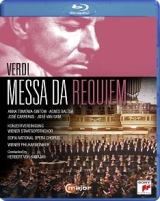Herbert von Karajans Wiener Aufnahme des Verdi-Requiems ist durchdrungen von tiefer Religiosität. Die Ergriffenheit stellt sich beim ersten Ton ein und lässt einen bis zur letzten Note nicht los. Gewiss, Karajan lässt den Gefühlen freien Lauf, aber reagieren wir nicht alle mit starken Gefühlen auf den Tod? Hier werden Schmerzen hörbar, und die göttliche Güte kommt ebenso zum Ausdruck wie die menschliche Angst.
Wo andere hinreißende Musik machen (Solti), oder ein opernhaftes, auf Effekte bedachtes Requiem bieten (Bernstein) wird Karajan der geistigen Sphäre des Werkes vollauf gerecht. Er wird dabei von den Wiener Philharmonikern und den Chören aus Wien und Sofia mustergültig unterstützt. Hatte man gedacht – angesichts des großen Chores -, der Maestro würde viel Wert auf die gewaltigen Klangmassen legen, so war das eine falsche Annahme. Alle nicht lauten Passagen, vor allem der Piano- und Pianissimogesang, wie man ihn so selten zu hören bekommt, werden durch eine starke Verinnerlichung und sehr viel Spannung zu nachhaltigen Erlebnissen.
Das Gesangquartett ist exzellent und in seiner Homogenität fast einmalig Anna Tomowa-Sintow hat herrliche Momente, Agnes Baltsa stellt sich ganz in den Dienst der Musik und hat sehr bewegende Momente, José van Dam singt besinnlich und mit tiefem Ernst, während José Carreras die am meisten schmerzerfüllte Stimme hat.
Die Aufnahme ist von einer sehr guten Räumlichkeit, erstaunlich in ihrer Durchhörbarkeit und kann mit einer Dynamik aufwarten. In der von DG veröffentlichten geschnittenen CD-Aufnahme sind einige kleine Mängel, die in Livemitschnitt auftauchen, nicht zu hören, aber die Spannung des Livekonzerts ist sicherlich ein nicht zu ersetzender Trumpf dieser Veröffentlichung.
Die Verfilmung des Konzerts durch Ernst Wild ist ausgezeichnet.
Herbert von Karajan’s Viennese recording of the Verdi Requiem is permeated with deep religiosity. The emotion sets in at the first note and does not let go until the last. Certainly, Karajan gives free rein to emotion, but don’t we all react to death with strong feelings? Here pain becomes audible, and divine goodness is expressed as well as human anguish.
Where others make rapturous music (Solti), or offer an operatic Requiem, intent on effects (Bernstein), Karajan does full justice to the spiritual sphere of the work. He is supported in exemplary manner by the Vienna Philharmonic and the choirs from Vienna and Sofia. If one had thought – in view of the large choir – that the maestro would put much emphasis on the enormous sound masses, this was a wrong assumption. All the non-loud passages, especially the piano and pianissimo singing, so rarely heard, become lasting experiences through a strong interiorization and a great deal of tension.
The vocal quartet is excellent and almost unique in its homogeneity. Anna Tomowa-Sintow has glorious moments, Agnes Baltsa puts herself entirely at the service of the music and has very moving moments, José van Dam sings contemplatively and with deep seriousness, while José Carreras has the most anguished voice.
The recording has a very good spaciousness, amazing in its transparency, with great dynamics. In the edited CD recording released by DG, some minor flaws that appear in live recordings cannot be heard, but the excitement of the live concert is certainly an irreplaceable asset of this release.
The filming of the concert by Ernst Wild is excellent.






















